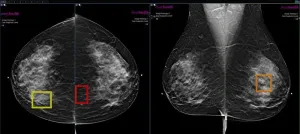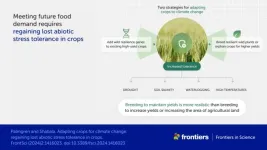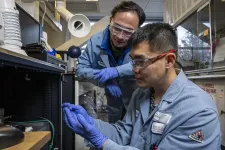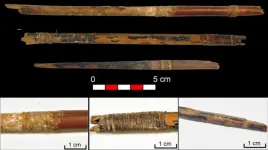(Press-News.org) Patients and families affected by food allergy worry when they fly and often make travel decisions with food allergy management top-of-mind
Airlines don’t always honor buffer zones, allergen-free food or cabin announcements that were promised to travelers during the booking process
Simple steps to help ensure the safety of travelers with food allergy can go a long way
CHICAGO ---The skies aren’t always so friendly for patients and families affected by food allergies, who may often experience worry and anxiety regarding airline travel, according to a new study from the Center for Food Allergy and Asthma Research at Northwestern University (CFAAR).
The study will be published the morning of Dec. 5 in The Journal of Allergy and Clinical Immunology — IN PRACTICE.
The findings, which reflect survey responses from more than 4,700 individual patients and families across the world, show that airline travel is a significant source of worry and anxiety for individuals managing food allergy for many reasons.
Specific sources of worry for those traveling with food allergy include:
Uncertainty regarding whether specific accommodations arranged during the flight-booking process will be honored when individuals arrive at the airport. For example, many respondents reported being told by airlines that food allergy-related cabin announcements would be made (20%), allergen-free “buffer” zones would be established (17%), or allergen-free food options would be available on board (23%), yet these promised accommodations were not granted in-flight.
Reportedly having to sign special waivers absolving the airline of liability (5%) or provide a signed doctor’s note that they are “fit to fly” (12%) prior to boarding the plane.
Potentially having epinephrine or allergy-safe foods confiscated or contaminated by airport security/customs agents.
Food allergies are on the rise and affect more than 33 million people in the U.S., according to data previously published by lead author Christopher Warren, director of population health research at Northwestern’s CFAAR, and current study senior author Dr. Ruchi Gupta, who directs CFAAR.
“These data clearly show that air travel is a major stressor for those affected by food allergy — to the point that food allergy-related airline policies were the single-most important consideration respondents identified when making air-travel decisions — taking priority over factors like the proximity of the airport to their home, flight duration and price,” Warren said.
“We are not asking for the moon and stars, we just want reasonable accommodations that are promised in advance of travel to be honored at 30,000 feet,” said study co-author Lianne Mandelbaum, a leading advocate for the implementation of airline safety measures to protect food-allergic passengers and founder of the non-profit No Nut Traveler.
“On every flight it is uncertain if and how crew members will accommodate nut allergies, and this adds tremendous unnecessary stress,” Mandelbaum said. “Flying with food allergies is akin to a game of roulette, each flight a random spin around the wheel.”
Mandelbaum has collected testimonials on No Nut Traveler that include people with food allergies being kicked off flights for asking for an announcement, being mocked by flight attendants and being ridiculed by other passengers.
Passengers simply want the precautions they requested during the booking process and were told would be provided, Mandelbaum said. These include being allowed to pre-board the flight and wipe down their space to remove allergens and establishing a buffer zone around them where allergens won’t be served.
“When you get to the gate and everyone acts like you’re crazy for bringing this up, that’s a terrible experience,” she said.
But not everyone flying with a food allergy feels similarly empowered to advocate for their medical needs during air travel.
“We also found that a disturbingly high proportion of surveyed travelers reported deliberately not disclosing their food allergy when travelling, with many expressing concern that such efforts would lead to undesired consequences,” said Warren, who also is an assistant professor of preventive medicine at Northwestern University Feinberg School of Medicine.
“Most travelers we surveyed expressed confidence that their anxiety could be substantially reduced if airlines systematically implemented appropriate policies, and around one in three respondents could recall a specific experience where an airline or flight crew member went ‘above and beyond’ to accommodate their food allergy, accommodations that were often related to the crew member’s own personal experiences with food allergy,” Warren said.
“On the occasions when I have been called upon to treat in-flight health emergencies and have personally cracked open the in-flight medical bag, I have been pleasantly surprised each time I found unexpired epinephrine auto-injectors ready for immediate use,” said senior author Gupta, who has personal experience effectively managing food allergy during air travel. “However, I know that this is not always the case. Every traveler and family at risk of anaphylaxis deserves the peace of mind that their potentially life-saving medication is unexpired and ready for use in every emergency kit.”
This study engaged more than 40 global research institutions and patient advocacy organizations to better understand the experiences, barriers and desired facilitators of safe airline travel.
The title of the article is “Understanding experiences, barriers, and facilitators of safe airline travel: A global survey of food allergy patients and caregivers.”
END
More images and video available- see link in the Notes section.
A new study suggests that the fundamental abilities underlying human language and technological culture may have evolved before humans and apes diverged millions of years ago. The findings will be published 5th December 2024 in the journal PeerJ.
Many human behaviours are more complex than those of other animals, involving the production of elaborate sequences (such as spoken language, or tool manufacturing). These sequences include the ability to organise behaviours by hierarchical chunks, and to understand relationships between distantly separated elements.
For example, even relatively simple human behaviours like making ...
PULLMAN, Wash. – Analysis of cheek swabs taken from pregnant women revealed a potential epigenetic biomarker for preeclampsia, a potentially life-threatening condition that often leads to preterm births.
While a clinical trial is needed to confirm the results, a study published in the journal Environmental Epigenetics offers hope that a simple test can be developed to identify preeclampsia earlier in pregnancy. Currently preeclampsia is usually identified by symptoms, such as abnormally high blood pressure, which only appear in the second trimester of pregnancy. Sometimes the condition can go undetected ...
CHICAGO – More than a third of women across 10 health care practices chose to enroll in a self-pay, artificial intelligence (AI)-enhanced breast cancer screening program, and the women who enrolled were 21% more likely to have cancer detected, according to research being presented today at the annual meeting of the Radiological Society of North America (RSNA).
AI has shown great promise in mammography as a “second set of eyes” for radiologists providing decision support, risk prediction and other benefits. Despite its promise, AI is not yet reimbursed by insurance, which likely is slowing its adoption ...
We all need to eat, but the impact of the climate crisis on our crops is throwing the world’s food supply into question. Modern crops, domesticated for high food yields and ease of harvesting, lack the genetic resources to respond to the climate crisis. Significant environmental stresses are reducing the amount of food produced, driving supplies down and prices up. We can’t sustainably take over more land for agriculture, so we need to change our crops—this time to adapt them to the world we have altered.
“Agriculture is highly vulnerable to climate change, and the intensity and frequency of extreme events is only going to increase,” said Prof Sergey ...
— By Michael Matz
The Department of Energy’s Lawrence Berkeley National Laboratory (Berkeley Lab) and several collaborating institutions have successfully demonstrated a machine-learning technique to accelerate discovery of materials for film capacitors — crucial components in electrification and renewable energy technologies. The technique was used to screen a library of nearly 50,000 chemical structures to identify a compound with record-breaking performance.
The other collaborators from University of Wisconsin–Madison, Scripps Research Institute, University of California, ...
Researchers from Max Planck Florida Institute for Neuroscience have discovered a new pathway to forming long-term memories in the brain. Their work suggests that long-term memory can form independently of short-term memory, a finding that opens exciting possibilities for understanding memory-related conditions.
A New Perspective on Memory Formation
Our brain works diligently to record our experiences into memories, creating representations of our daily events that stay with us for short time periods. Current scientific theories of memory formation suggest that short-term memories are stored in what we can imagine as a temporary art exhibition in our ...
• A research team led by the UAB has made exceptional discoveries on prehistoric archery from the early Neolithic period, 7,000 years ago.
• The well organic preservation of the remains of the Cave of Los Murciélagos in Albuñol, Granada, made it possible for scientists to identify the oldest bowstrings in Europe, which were made from the tendons of three animal species.
• The use of olive and reed wood and birch bark pitch in the making of arrows reveals an unprecedented degree of precision and technical mastery, as highlighted in the study, published in Scientific Reports. ...
EMBARGOED: NOT FOR RELEASE UNTIL 00.01 UK TIME ON THURSDAY 5 DECEMBER 2024
Tyrannosaur teeth discovered in Bexhill-on-Sea with help of retired quarryman
Spinosaur and Velociraptor-like predators also roamed East Sussex 135 million years ago
Research led by the University of Southampton has revealed that several groups of meat-eating dinosaur stalked the Bexhill-on-Sea region of coastal East Sussex 135 million years ago.
The study, published today [5 December 2024] in Papers in Palaeontology, has discovered a whole community of predators belonging to different ...
TORONTO - New research published by a team of researchers from the University of Toronto in collaboration with colleagues from the University of Alberta has found that women who have had both ovaries surgically removed before the age of 50 and carry a variant of the apolipoprotein gene, the APOE4 allele, are at high risk of late-life Alzheimer disease (AD). Use of hormone therapy mitigates this risk.
Why does this matter?
By 2050, Alzheimer’s disease is projected to affect 12.7 million individuals 65 and older with women comprising two-thirds of that number. It is still unclear why Alzheimer’s disease is more prevalent in women than in men, but it may have to do with ...
BALTIMORE, Dec. 5, 2024: Obesity affects a staggering 40 percent of adults and 20 percent of children in the United States. While some new popular therapies are helping to tackle the epidemic of obesity, there is still so much that researchers do not understand about the brain-body connection that regulates appetite. Now, researchers have discovered a previously unknown population of neurons in the hypothalamus that regulate food intake and could be a promising new target for obesity drugs.
In a study published in the Dec. 5 issue of Nature, a team of researchers from the Laboratory ...






